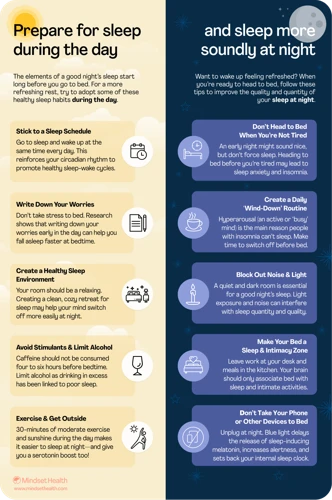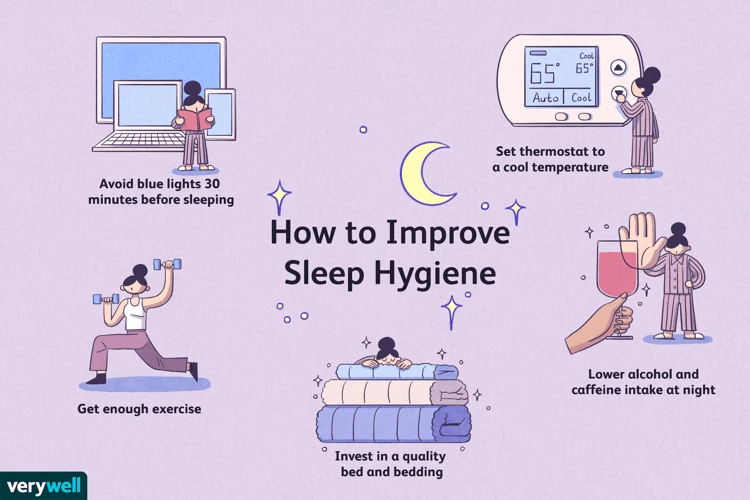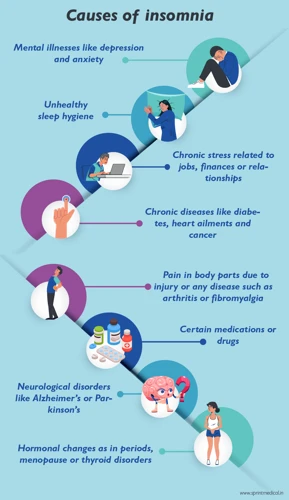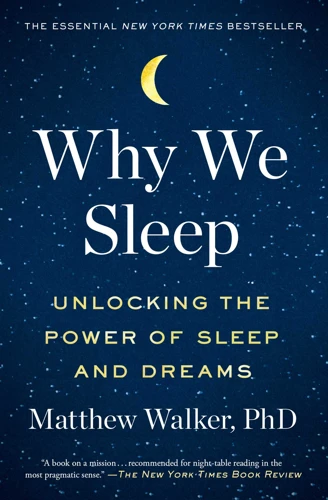Introduction

Getting a good night’s sleep is crucial for our overall health and well-being. However, for many individuals, falling and staying asleep can be a challenge. This is commonly known as insomnia, which can have a negative impact on one’s life, including their productivity, mood, and physical health. In this article, we will explore the importance of quality sleep, the causes of insomnia, and effective management tips to help you get the restful sleep you deserve.
What is insomnia?
Insomnia is a sleep disorder characterized by difficulty falling asleep or staying asleep. It can be acute or chronic and can affect people of all ages. Some common symptoms of insomnia include feeling tired, having trouble concentrating during the day, and experiencing irritability or mood swings. The following are some key points to understand about insomnia:
- Insomnia is a sleep disorder that affects many people worldwide.
- It can be caused by a variety of factors, including stress, anxiety, depression, chronic pain, medication side effects, and more.
- Insomnia can be acute or chronic, depending on how long it lasts.
- Acute insomnia tends to be short-term and is commonly caused by stress or a major life change, while chronic insomnia lasts for at least three months and may be related to an underlying medical condition.
- Some common symptoms of insomnia include difficulty falling asleep or staying asleep, waking up too early, feeling tired or not refreshed in the morning, and having trouble functioning during the day.
Insomnia can have a significant impact on a person’s quality of life and overall health, making it important to seek treatment if you are struggling with sleep issues.
The Importance of Quality Sleep

As we navigate through our busy lives, it can be easy to overlook the significance of quality sleep. However, the truth is that getting a good night’s rest is essential for our overall well-being. Studies have shown the numerous benefits that come with regular, restful slumber – from improved cognitive performance and mood to better physical health. It’s no secret that sleep plays a critical role in our overall health and happiness, and the first step in achieving quality rest is understanding the link between sleep and our overall quality of life.
The Link Between Sleep and Health
Getting a good night’s sleep is crucial for maintaining good overall health. Poor sleep quality can lead to a range of health problems, affecting both physical and mental health. It can compromise the immune system, increase the likelihood of developing chronic conditions, and even affect memory and cognitive function.
Studies have shown that sleep deprivation can have a significant impact on the body’s hormones and metabolism. Lack of sleep can trigger an increase of stress hormones in the body such as cortisol, which can increase inflammation and contribute to the development of chronic diseases. Conversely, a good night’s sleep can lead to lower stress levels and better immune function.
Sleep plays a substantial role in brain function. High-quality sleep is essential for proper cognitive function, memory consolidation, and emotional regulation. Inadequate sleep can result in emotional instability, decreased productivity, and difficulty with concentration.
The following table outlines some of the potential health consequences of poor sleep quality:
| Consequence | Description |
| Increased risk of obesity | Sleep deprivation has been linked to weight gain and an increased risk of obesity. |
| Inflammation | Lack of sleep can increase inflammation in the body and contribute to the development of chronic conditions, such as heart disease and diabetes. |
| Impaired immune function | Poor sleep quality can compromise the immune system, increasing susceptibility to illness and infection. |
| Mental health issues | Insufficient sleep has been linked to an increased risk of depression, anxiety, and other mental health issues. |
| Impaired cognitive function | Poor sleep quality can lead to decreased cognitive function, affecting memory, attention, and decision-making. |
Clearly, the link between sleep and health cannot be understated. It is crucial to develop healthy sleep habits to maintain good overall health and well-being.
What Causes Insomnia?
Insomnia can be caused by a variety of factors, including physical, psychological, and environmental factors. Understanding the root cause of your insomnia can help you find the most effective management plan. Here are some common causes of insomnia:
- Stress and Anxiety: Worries and anxieties can keep your mind racing, making it difficult to fall asleep and stay asleep.
- Depression: Depression can disrupt your sleep patterns, leading to insomnia. It’s important to seek treatment for both depression and insomnia.
- Medical Conditions: Chronic pain, asthma, acid reflux, and other medical conditions can make it difficult to sleep.
- Medications: Certain medications, such as those used to treat asthma or depression, can interfere with sleep.
- Disruptive Sleep Environment: A noisy or uncomfortable sleep environment can make it difficult to fall asleep and stay asleep.
- Irregular Sleep Schedule: When your sleep schedule is erratic, it can disrupt your body’s natural sleep-wake cycle.
Identifying the cause of your insomnia may require some trial and error. Keep a sleep diary to track your sleep patterns and any factors that may be contributing to your insomnia. Once you understand the root cause, you can begin implementing insomnia management techniques to improve your sleep.
Insomnia Management Tips

When it comes to managing insomnia, there are several effective tips and strategies that can help improve the quality of your sleep. These tips range from establishing a consistent bedtime routine to creating a sleep-friendly environment and practicing relaxation techniques. By implementing some of these strategies, you may be able to improve your sleep and reduce the impact of insomnia on your daily life. Let’s explore some of the most helpful tips for managing insomnia.
Establishing a Bedtime Routine
One effective way to manage insomnia is by establishing a consistent bedtime routine. This routine helps signal to your body that it’s time to wind down and prepare for sleep. Consider the following tips when creating your own bedtime routine:
| Tip | Description |
| Stick to a schedule | Go to bed and wake up at the same time every day, even on weekends or days off. |
| Wind down before bed | Engage in relaxing activities such as taking a warm bath or shower, reading a book, or practicing yoga. |
| Avoid screens | Avoid using electronic devices such as smartphones, tablets, or computers for at least an hour before bed. |
| Limit caffeine and alcohol | Avoid consuming caffeine or alcohol close to bedtime as they can interfere with sleep. |
| Create a calm environment | Make sure your bedroom is conducive to sleep by keeping it cool, dark, and quiet. Consider investing in comfortable bedding or pillows to enhance your comfort. |
By incorporating these tips into your bedtime routine, you can train your body and mind to associate specific activities and behaviors with sleep. Over time, this can help improve both the quality and quantity of your sleep, making you feel more refreshed and alert throughout the day.
Avoiding Stimulants
Another important step in managing insomnia is avoiding stimulants. Stimulants are substances that can make it difficult to fall asleep or stay asleep, and consuming them too close to bedtime can affect the quality of your sleep. Below is a table that outlines some common stimulants that you should avoid in the evening:
| Stimulant | Effect | Common Sources |
|---|---|---|
| Caffeine | Stimulates the central nervous system | Coffee, tea, soda, energy drinks, chocolate |
| Nicotine | Stimulates the central nervous system | Cigarettes, vaping products |
| Alcohol | Disrupts REM sleep, leading to poor sleep quality | Beer, wine, spirits |
| Sugar | Can disrupt blood sugar levels, causing wakefulness and restlessness | Candy, desserts, sweetened beverages |
As you can see, caffeine and nicotine both stimulate the central nervous system, making it difficult to relax and fall asleep. Additionally, while alcohol may initially make you feel sleepy, it actually disrupts the REM stage of sleep, which is important for feeling rested and refreshed. Finally, consuming sugary foods and drinks too close to bedtime can cause blood sugar swings, leading to restless sleep.
In order to avoid these stimulants, it’s important to be mindful of what you’re consuming and when. Try to limit your caffeine intake to the morning hours, and avoid smoking or using vaping products in the evening. Similarly, try to avoid alcohol and sugary foods close to bedtime. By being mindful of your habits and making changes where necessary, you can help manage your insomnia and promote better sleep.
Creating a Sleep-Friendly Environment
Creating a sleep-friendly environment is crucial to promoting restful sleep. The following table outlines some tips for optimizing your sleep environment:
| Tip | Description |
| Darken your room | Light signals your brain that it’s time to wake up, so reducing light exposure in your bedroom can help signal to your brain that it’s time to sleep. Consider blackout curtains or an eye mask to create a dark sleeping environment. |
| Avoid electronic devices | The blue light emitted by electronic devices (such as phones, tablets, and laptops) can disrupt your natural sleep cycle. It’s best to avoid using these devices before bed or to use a blue-light filter to reduce your exposure. |
| Keep the temperature comfortable | Your body temperature drops while you sleep, so keeping your room at a cool temperature can help promote restful sleep. A temperature between 60-67°F is optimal for most people. |
| Reduce noise | Noise can disrupt your sleep and cause you to wake up at night. Consider using earplugs or a white noise machine to drown out any unwanted sounds. |
| Invest in a comfortable mattress and pillows | Your bed should be a comfortable and supportive place to sleep. A mattress and pillows that are too soft or too firm can lead to discomfort and pain, which can make it difficult to sleep. |
By following these tips, you can create an environment that promotes restful and restorative sleep. Remember, a good night’s sleep is crucial for your overall health and well-being.
Practicing Relaxation Techniques
In addition to establishing a consistent bedtime routine and creating a sleep-friendly environment, practicing relaxation techniques can also help in the management of insomnia. Here are some relaxation techniques you can try to improve the quality of your sleep:
- Deep breathing: Take slow, deep breaths to help calm your mind and relax your body. Inhale slowly through your nose, hold for a few seconds, then exhale slowly through your mouth.
- Muscle relaxation: Starting from your head and moving down to your toes, consciously tense and then relax each muscle group in your body, one at a time. This can help relieve tension and promote relaxation.
- Meditation: Practice mindfulness meditation to help you focus on the present and quiet your mind. You can try guided meditation, where an instructor talks you through relaxation techniques, or use a meditation app to help you get started.
- Progressive muscle relaxation: Like muscle relaxation, this technique involves tensing and relaxing different muscle groups in your body. However, instead of doing it all at once, you focus on one group at a time and gradually work your way through your body.
- Yoga: Incorporating yoga into your daily routine can help reduce stress and promote relaxation, which can improve your sleep quality. There are many different types of yoga, so try to find one that suits your preferences and skill level.
By incorporating these relaxation techniques into your nightly routine, you can decrease stress and tension, allowing you to fall asleep more easily and sleep more deeply.
Getting Sunlight and Exercise During the Day
Maintaining an active lifestyle during the day can greatly improve your chances of a good night’s sleep. Getting sunlight and exercise are important factors that can help regulate our sleep-wake cycle, also known as the circadian rhythm.
Exposure to sunlight helps regulate our internal clock, making us feel more alert during the day and promoting better sleep at night. Even just 15-30 minutes of sunlight exposure in the morning can make a difference.
Incorporating regular exercise into your daily routine can also improve your sleep quality. Exercise releases endorphins that can help reduce stress and anxiety, two common factors that contribute to insomnia. However, it’s important to time your exercise routine appropriately, as exercising too close to bedtime can actually have the opposite effect and keep you awake.
It’s recommended to aim for at least 30 minutes of moderate-intensity exercise, such as brisk walking, jogging, cycling, or swimming, most days of the week. If you’re not used to regular exercise, start slowly and build up gradually.
In addition to sunlight and exercise, there are other lifestyle changes you can make to promote better sleep. Creating a relaxing bedtime routine, avoiding stimulants, and practicing relaxation techniques are all effective strategies for managing insomnia.
Considering Sleep Aids
For people with chronic insomnia or difficulty sleeping, sleep aids may be a viable option. Sleep aids can come in the form of prescription medication or over-the-counter supplements. Before considering sleep aids, it is important to consult with a healthcare professional to determine the best course of treatment. Here are some common sleep aids that may be prescribed or recommended:
| Sleep aid | Description |
|---|---|
| Sedative-hypnotics | Prescription medication that promotes drowsiness and can help people fall asleep. However, they can be habit-forming and may have side effects. |
| Antidepressants | Some types of antidepressants can have sedative effects and be used to treat insomnia. They can also have side effects and may take several weeks to become effective. |
| Melatonin | A naturally occurring hormone that regulates sleep-wake cycles. Supplements are available over-the-counter and may be helpful for people with sleep rhythm disorders or jet lag. |
| Valerian root | A natural supplement that can help improve sleep quality and quantity. It has fewer side effects than prescription medication, but it may take several weeks to become effective. |
It is important to note that sleep aids should not be relied on as a long-term solution for insomnia. They should only be used as directed by a healthcare professional and in conjunction with other behavioral and environmental changes to promote better sleep.
When to Seek Professional Help
As much as we try to manage our insomnia on our own, there may be times when we need to seek professional help. It is important to know when to reach out to a healthcare provider, as they can offer valuable assistance in addressing the underlying causes of insomnia. In this section, we will discuss the signs and symptoms that indicate the need for professional help. We will also explore the various types of insomnia treatments that healthcare providers may offer.
Types of Insomnia Treatment
Insomnia can be a serious condition that affects a person’s overall health and well-being. There are numerous treatment options available for those who are struggling with this sleep disorder.
Behavioral therapies are often the first line of treatment for people with insomnia. These therapies aim to change certain behaviors and habits that may be contributing to sleeplessness. This can include establishing a consistent bedtime routine, avoiding the use of electronics in the bedroom, and reducing caffeine consumption.
Cognitive behavioral therapy for insomnia (CBT-I) is a specific type of therapy that helps patients identify and change negative thought patterns and behaviors that may be contributing to their sleep problems. This type of therapy is often done in conjunction with other treatments, such as medication.
Medications can also be used to treat insomnia. There are several different types of medications that may be prescribed, including benzodiazepines, non-benzodiazepine hypnotics, and melatonin agonists. It is important to work closely with a healthcare provider when taking medication for insomnia, as some medications can be habit forming and may have unwanted side effects.
Alternative therapies, such as acupuncture or herbal supplements, may also be used to treat insomnia. However, it is important to understand that there is limited scientific evidence to support the use of these therapies for insomnia.
If you are struggling with insomnia, it is important to talk to a healthcare provider about the treatment options that are available to you. With the right approach, it is possible to achieve restful, rejuvenating sleep and improve overall health and wellbeing.
| Treatment Type | Description |
|---|---|
| Behavioral Therapies | Establishing a consistent bedtime routine, avoiding use of electronics in the bedroom, reducing caffeine consumption. |
| Cognitive Behavioral Therapy for Insomnia (CBT-I) | Helps patients identify and change negative thought patterns and behaviors that contribute to sleep problems. Often done in conjunction with other treatments. |
| Medications | May include benzodiazepines, non-benzodiazepine hypnotics, and melatonin agonists. Should be taken under close medical supervision. |
| Alternative Therapies | Includes acupuncture or herbal supplements, but evidence supporting efficacy is limited. |
Conclusion
In conclusion, insomnia is a common sleep disorder that affects many individuals. The consequences of chronic insomnia can be significant, impacting both physical and mental health. Therefore, it is crucial to address and manage insomnia effectively.
One of the most critical steps in insomnia management is establishing a consistent bedtime routine. This should include practices such as avoiding technology before bed, creating a restful sleep environment, and practicing relaxation techniques like deep breathing or meditation.
It is also vital to avoid stimulants such as caffeine or alcohol and to get ample sunlight and exercise during the day. These habits will help regulate the body’s natural sleep-wake cycle, making it easier to fall asleep and stay asleep throughout the night.
While some people may benefit from over-the-counter sleep aids, it is important to discuss any sleep medication use with a healthcare professional as they can have potential side effects or interactions with other medications.
If self-management techniques do not improve symptoms or if they begin to impact daily functioning, it may be necessary to seek professional help for insomnia. Treatment options may include therapy, medication, or a combination of the two.
In summary, addressing insomnia and implementing good sleep hygiene practices can greatly improve the quality of life for those who struggle with this sleep disorder. By understanding the causes of insomnia and making important lifestyle changes, individuals can achieve healthier and more consistent sleep patterns, leading to better overall health and well-being.
Frequently Asked Questions
How do I know if I have insomnia?
If you regularly have trouble falling or staying asleep, and feel tired during the day, you may have insomnia.
Can insomnia be a symptom of another condition?
Yes, insomnia can be a symptom of anxiety, depression, or other health conditions.
What are some common triggers for insomnia?
Stress, caffeine, alcohol, and certain medications can all be triggers for insomnia.
How long does a typical episode of insomnia last?
Episodes of insomnia can vary in length, from one night to several weeks depending on the individual.
Can insomnia have long term health effects?
Yes, long term insomnia can increase the risk for depression, anxiety, obesity, and other health problems.
Why is creating a sleep-friendly environment important?
A sleep-friendly environment can help signal the brain that it is time for sleep, leading to improved sleep quality.
What are some relaxation techniques that can help with insomnia?
Deep breathing, meditation, and progressive muscle relaxation are all relaxation techniques that can help with insomnia.
Are there any natural remedies for insomnia?
Valerian root, chamomile tea, and melatonin supplements are all natural remedies that have been shown to help with insomnia.
Can exercise really help with insomnia?
Yes, regular exercise can improve sleep quality and help alleviate insomnia, but it is important to exercise earlier in the day and not right before bed.
When should I seek professional treatment for insomnia?
If your insomnia is severe, persistent, or significantly impacting your daily life, it is important to seek professional treatment from a healthcare provider.








